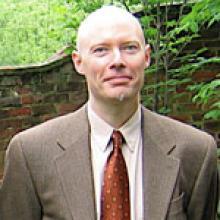
David Herman

Office Address
PO Box 400783
265 New Cabell Hall
Charlottesville, VA 22904-4783
Office Hours: T/TH 3:30-4:30pm
Education
BA, Russian, Haverford College, 1983
MA, Russian, Bryn Mawr College, 1985
PhD, Slavic Langs. and Lits., University of California, Berkeley, 1993
Selected Awards
- NEH Fellowship, 2008-9 (for Tolstoy and the Imperfections of Fiction)
- Postdoctoral Fellowship, ACLS/SSRC, 1996-7 (for Poverty of the Imagination)
- U.C. Berkeley Distinguished Graduate Student Instructor Award
- Phi Beta Kappa
Publications
"Khadzhi-Murat's Silence." Slavic Review 64:1 (2005): 1-23.
Poverty of the Imagination: 19th-Century Russian Literature About the Poor. Evanston, Northwestern University Press: 2001.
Second-Year Russian: A Textbook (1999, course packet used at UVa, 534 p.).
"Don Juan and Don Alejandro: The Seductions of Art in Pushkin's Stone Guest." Comparative Literature 51:1 (1999): 3-23.
"Innocents at Home: 'Poor Liza' as a Response to The Letters of a Russian Traveler." Russian Literature 44:2 (1998): 159-83.
"Allowable Passions in Anna Karenina." Tolstoy Studies Journal 8 (1998) (Special Issue: Anna Karenina): 5-32.
"Stricken by Infection: Art and Adultery in Anna Karenina and Kreutzer Sonata." Slavic Review 56:1 (1997): 15-36.
"A Requiem for Aristocratic Art: Pushkin's 'Egyptian Nights.'" Russian Review (1996): 661-80.
Research Interests
19th-century Russian literature, Tolstoy, 18th-century Russian literature, medieval Russian literature, literary theory, language pedagogy.
My work at the moment focuses on Tolstoy's fiction and consists of three projects loosely emphasizing the tragic side of the writer's worldview, reading the fiction "backwards" (starting with trends more evident in the late fiction and exploring their importance for all his narratives), and looking at the implications of the ethical ideals endorsed inTolstoy's fiction for the way writing should be done, that is, the dialogue between plot and form.
The first project examines the ideal mindset of the individual. Tolstoy's plots juxtapose innocent, slightly naïve, unself-conscious characters to others who are unnaïve, aware of the true nature of things, and, as a result, less loving and hence less moral – always preferring the former. The best characters accept fate, however difficult, and are taciturn, even silent (often in covert ways). Tolstoy's plots seem to favor unself-consciousness even if it precludes full insight, innocence even if it entails a false understanding of reality, and silence even if undermines communication, a deep paradox for a literature that aspires to know and show all things. Much of my work here is a detailed examination of the thought processes of Tolstoy's moral exemplars, a topic less explored than one would think.
The second project explores a person's relationship with the outside world: the many forms of compassion and love, our gropings for a withdrawn God, and the creeping sense of orphanhood underpinning Tolstoy's worldview. The later fiction takes orphanhood as grounds for a theology, showing human isolation to be tragic yet, curiously, ethically necessary, both a grievous human failing and a divine imperative. Compassion and love, in younger Tolstoy the greatest good, in older Tolstoy become deeply problematic, as not just sexual love but more broadly brotherhood and compassionate understanding are rejected as morally unhealthy. Only one narrowly defined concept of love continues to be allowed, little like the term's normal meaning and embodying a deep cynicism about human beings' ability to intersect meaningfully except as stranger. This part of my work is directed against a widespread critical tradition which views Tolstoyan Christianity as predicated on attentive concern for others in their unique specificity.
Behind these two projects Tolstoy can be seen debating with himself about a duality that cleaves his thinking: on one side stand childlike innocence, naturalness, and a complex of self-based virtues (virtues that presume a strong sense of self, like sincerity); on the other, adulthood, Christianity, selflessness, and sacrifice. The fiction takes varying strong stances at various times, trumpeting now the authentic self, now selflessness, all the while testing to see if the two can, in some higher sense, be united and declared one. The outcome Tolstoy would like is for sacrificial selflessness to prove natural, innocent (untutored), and deeply satisfying to the sacrificing self, but, though he continually attempts this synthesis, it always proves elusive. Tolstoy ends up championing above all things selflessness, but never letting go of the suggestion that if we cannot have selflessness, we should have a particularly strong form of selfhood.
The third project looks at a broad paradox relating to literature itself that emerges from the first two. The highest virtues exemplified in Tolstoy's narratives are ways of knowing and thinking that are diametrically opposed to the mental operations used in the creation and consumption of narrative, fundamentally at odds with the curious, aware, communicative, resistant (to the given order of things) nature of literary art as Tolstoy understood it. If fiction exists to change something in the world, for example, Tolstoy's ideal characters accept God's plan and attempt to change nothing. In fact his moral ideal is not just to refrain from, but all one's life to have been radically incapable of, the kind of thinking used in making and decoding narrative. Yet the fact that Tolstoy wrote to communicate this to others unmistakably valorizes to the literary enterprise and its type of thinking, producing another enduring paradox never resolved. In an attempt to soften the paradox, Tolstoy all his life strives to dream up new literary forms consistent with ideals such as silence, but a fundamental antagonism between ethics and fiction, even a fiction entirely devoted to ethics, remains.